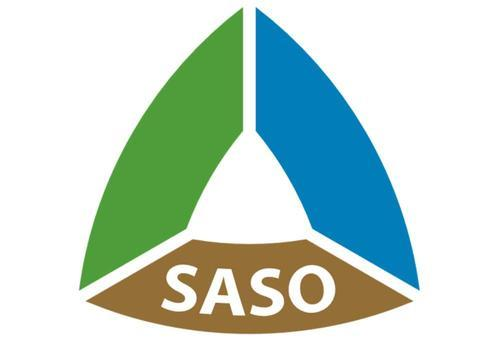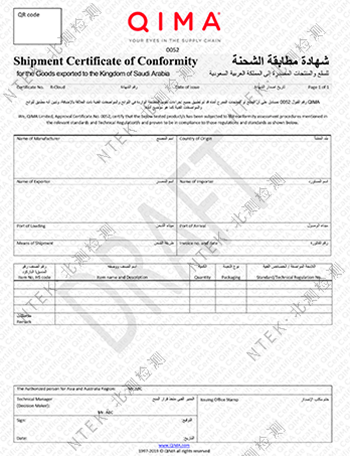Introduction
SASO is the abbreviation for Saudi Arabian Standards Organization, also known as the Saudi Arabian Standards Organization. In fact, many SASO standards are established based on the safety standards of relevant international organizations such as the International Electrotechnical Commission (IEC). Like many other countries, Saudi Arabia has added some unique items to its standards based on its civil and industrial voltage, geographical and climatic environment, ethnic and religious customs, etc. In order to protect consumers, SASO standards are not only applicable to products imported from abroad, but also to products produced domestically in Saudi Arabia.

The necessity of SASO certification
The Saudi Arabian Ministry of Industry and Commerce and SASO require all products included in SASO certification standards to have a SASO certification certificate when entering Saudi customs. Products without SASO certification will be refused entry by Saudi port customs.
When exporting products to Saudi Arabia, a SASO certification certificate must be issued upon entry, and technical personnel from the Saudi Arabian Standards Organization will inspect the certificate; If SASO certificate cannot be issued, the product will be refused entry or sampled for testing at the laboratory of the Saudi Arabian Ministry of Industry and Commerce or the Saudi Arabian Standards Organization. If the test fails, the product will be refused entry and all costs will be borne by the exporting enterprise.
Certification type
1、 Pre shipment Compliance Verification
This method is most suitable for exporters or manufacturers with very few shipments. Before each shipment, it is necessary to apply for pre shipment inspection (PSI) and pre shipment testing (PST). If both are qualified, one can obtain the CoC certificate.
2、 Product Registration
This method is suitable for the vast majority of customers, and its advantage is that although each shipment inspection (PSI) is necessary, each batch of goods does not need to undergo pre shipment testing (PST). Customers can obtain the Statement for Registration (SfR) by submitting a declaration of compliance and providing test reports that comply with the import country and relevant international or domestic standards, and declaring that the product meets the basic requirements and national differences of the importing country.
3、 Type Approval Licensing
This method can not only save inspection or testing fees before each shipment, simplify repetitive application procedures, but also ensure delivery time. Therefore, it is favored by some large companies that ship frequently or on a large scale, and focus on quality and reputation. Exporters or manufacturers' products can only obtain a Statement for License (SfL) certificate if they fully comply with the mandatory standards of the importing and exporting country. The certificate is valid for one year, and an updated factory inspection report and annual fee must be submitted and reviewed by RLC before renewal. Products that have obtained SfL certificates no longer require pre shipment inspection (PSI) for each batch, but have been reduced to a few rare spot checks per year (usually 2-3 times per year, depending on the condition of the product).
The testing is conducted according to SASO/PAI standards or IEC standards plus national differences, and the requirements of SASO/PAI standards need to be considered separately. Some clauses have significant differences. The rated voltage in Saudi Arabia is 220V, 50/60Hz (with BS plug) or 127V, 60Hz (with UL plug) (a separate prototype is required for testing); The voltage in Kuwait is 240V, 50Hz (with BS plug).
Type certification requires factory inspection;
For electrical products exported to Saudi Arabia, the rated frequency indicated on the product must include 60Hz;
The user manual for air conditioners exported to Saudi Arabia must be in Arabic and English; Audio and video products, user manuals must be in Arabic;
The original safety regulations and EMC report must be issued by an accredited laboratory within 2-3 years.
Applicable product scope
With the increasing improvement of regulations by the Standards Bureau, more and more products are being included in the SASO certification list. The following sections are for reference only;
Group 1: Toys
Toys and playground equipment
Group 2: Electronic and Electrical Products
Air conditioning system, maximum capacity 60000 BTU (5 tons)
Combination audio or video equipment (non professional)
Non professional audio equipment
Video playback and recording system (non professional)
Large motor (<12 KW)
Electric motor (<12 KW)
Fax and Telex Equipment
Household electric cookware
Washing machine (<10 KG)
Clothes dryer (<10 KG)
Electric iron, ironing machine, steam iron, and handheld hair dryer
Food processor (non professional)
Meat slicer, meat grinder (non professional)
Elevators and escalators
Household microwave oven
Electric stove (<10 KW)
copier
Desktop and portable computers, monitors
Power transformer, distribution transformer (<1000 KVA)
Household refrigerators and freezers (<40 cubic feet)
Telephone, modem
Wires and cables (<1000V)
Non industrial vacuum cleaners, water pumps, and water sprayers,
Electric stove, electric heater
water dispenser
Evaporative cooler (<1.5 KW)
electric fan
Refrigeration compressor (<60000 BTU)
Tea and coffee machine, hot drink machine
Incandescent lamps, fluorescent lamps, discharge lamps, lampshades, lamp holders, etc
Manual switch, circuit breaker (<30A)
Light bulb, lamp tube, discharge light source
discharge tube
Town starter
Plug, socket, adapter
Road lighting
battery
Underwater lighting fixtures
Battery pack and grounding cable
Water pump (<12 KW)
Color, black and white television
General Purpose Transformers
Independent radio receiver
Water heater (<200 liters)
electricity meter
Cordless telephone
pressure cooker
Group 3- Automotive category
New passenger cars, trucks, buses, and multi-purpose vehicles
Old passenger cars, trucks, buses, and multi-purpose vehicles
auto glass
Automotive brake fluid
New tires for passenger cars, trucks, buses, and multi-purpose vehicles
Group 4- Chemical Products
Engine oil, transmission oil, hydraulic oil, turbine oil, and transformer oil
paint
Perfume and cosmetics
Household insecticides
Group 5: Other
Aluminum and aluminum alloy structural products
Steel, iron and alloy pipes
Jewelry such as gold, silver, gemstones, etc
Head dress for men - cotton shimaghs
Fire extinguisher (<24 KG)
cement
match
Low pressure household natural gas cylinder pressure regulating valve
facial tissue
cigarette
Application Process
Step 1: Data review:
1. RFC application form;
2. Manufacturer/Factory System Certificate;
3. Effective product testing report;
4. Final invoice or formal invoice;
5. Packing list;
6. Authorization letter (if required);
Step 2: On site inspection, the main approved items are as follows:
1. Visually inspect the surface quality of the goods;
2. Quantity (product quantity, outsourcing box quantity);
3. Packaging (product self packaging, product outsourcing);
4. Identification (product's own brand identification);
5. Mark (outer packaging box mark information);
6. Voltage (Saudi voltage 220V or 380V);
7. Frequency (Saudi frequency 60Hz);
8. Power
9. Origin (manufacturer or importer, MadeInChina);
Certificate Information

Copyright © Dongguan Di'en Testing Co., Ltd. Technical Support: Dongguan Guangsu Network Guangdong ICP No. 15086094-1
Mailing Address: Di'en Testing, Wusha Community, Chang'an Town, Dongguan City
Metrology & Calibration Contact:
Mr. Tai - Mobile: 13760389645
Ms. Li - Mobile: 15817661429
Product Testing Contact:
Ms. Yang - Mobile: 18123900885
Reliability, Failure Analysis, & Materials Testing Contact
Mr. Ye - Mobile: 13613003484
Copyright © Dongguan Di'en Testing Co., Ltd. Technical Support: Dongguan Guangsu Network Guangdong ICP No. 15086094-1